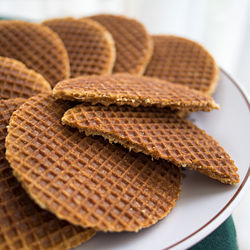Stroopwafels
 |
|
| Alternative names | Syrup waffle, treacle waffle, caramel cookie waffle |
|---|---|
| Type | Waffle |
| Place of origin | Netherlands |
| Region or state | Gouda |
| Created by | Gerard Kamphuisen |
| Main ingredients | Batter: flour, butter, brown sugar, yeast, milk, eggs Filling: syrup, brown sugar, butter, cinnamon |
| |
|
A stroopwafel (Dutch pronunciation: [ˈstroːpʋaːfəl]; literally "syrup waffle") is a waffle made from two thin layers of baked dough with a caramel-like syrup filling in the middle. It is popular in the Netherlands, where they were first made in the city of Gouda.
The stiff dough for the waffles is made from flour, butter, brown sugar, yeast, milk, and eggs. Medium-sized balls of dough are put into a heated waffle iron and pressed into the required uniformly thin, round shape. After the waffle has been baked, and while it is still warm, it is split into thin layered halves. The warm filling, made from syrup, brown sugar, butter, and cinnamon, is spread between the waffle halves, gluing them together.
The stroopwafel was first made in Gouda either during the late 18th century or the early 19th century by a baker using leftovers from the bakery, such as breadcrumbs, which were sweetened with syrup. One story ascribes the invention of the stroopwafel to the baker Gerard Kamphuisen, which would date the first stroopwafels somewhere between 1810, the year when he opened his bakery, and 1840, the year of the oldest known recipe for syrup waffles. In the 19th century, there were around 100 syrup waffle bakers in Gouda, which was the only city in which they were made until 1870. After 1870 they were also made at parties and in markets outside the city of Gouda. In the 20th century, factories started to make stroopwafels. In 1960, there were 17 factories in Gouda alone, of which four are currently still open.
...
Wikipedia
